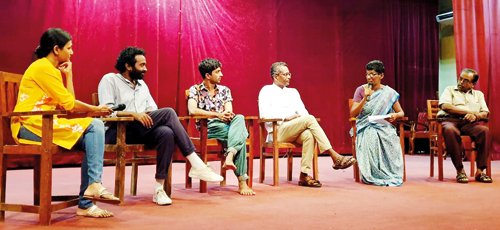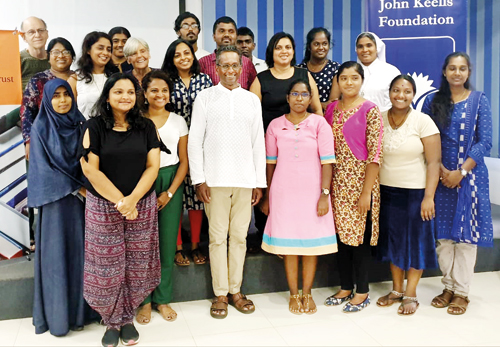The Gratiaen has its day in Jaffna

Sharing diverse views: From left, Thanuja Jayawardene, Arun Welandawe- Prematilleke, Ruvin de Silva, Shyam Selvadurai, Vasuki Rajasingham and Ayathurai Santhan
We were none of us alien to the sunny Jaffna peninsula- indeed some of us had our roots within its arid soil. But it was the first time the Gratiaen had gone North.
The Gratiaen Trust established by Michael Ondaatje to recognise and promote creative writing in English, had long wanted to reach more beyond Colombo but the funds were lacking. This year, with the John Keells Foundation generously covering costs and with the University of Jaffna’s Department of English and Linguistics on board, an outreach programme was possible – and where better than Jaffna- a twilight city looking to recover eclipsed glory?
Cruising past gopurams with candy striped walls and ubiquitous girls on bicycles, the Gratiaen team was ready for the day- a long one with a creative writing workshop and a play, hosted by the University of Jaffna.
The news that Shyam Selvadurai was holding a creative writing workshop had drawn full response- and 20 people had been handpicked- on literary merit. The author of Funny Boy and Hungry Ghost from Canada was as avid for the chance as his acolytes. Shyam loves to nurture young writers, guiding them to explore and hone their own creativity.
The workshop held last Sunday, was concerned with different points of view used in narration. It was like tunnelling into the back of a writer’s mind. It is easy to be dismissive about the importance of who is talking: surely the story is what is central? Soon, Shyam had everyone thinking otherwise.
The workshop was punctuated with lots of writing practice. Talking to the participants, one felt there was a jolt of happy surprise to know that by imbibing the correct techniques, creative writing could be effectively learnt- and that it is not an arcane gift for a few-nor an unmapped wilderness to fear.
Sumithri Sivapalan (24) told me that the workshop was valuable to her because of the writing exercises- which made them describe sensory experiences. “Describing people we know by drawing on all the five senses- not just sight but even touch and smell- that was a stimulating challenge.”
Sanjutha Thiraviyanayagam from the University of Jaffna was struck by Shyam’s deft analysis of advantages and disadvantages in different points of view. “Using the skills I have learnt, I want to be a social commentator,” she said “and use the language to be helpful to the people.”
Prasanya Vijeraja (25) from Batticaloa, studies at the Jaffna University. The techniques she learnt, she hopes, will help her write better but also to become an English teacher, “because in Batticaloa we don’t have English literature teachers.”
Atchutha Yogarajah (33) from Vavuniya teaches students following English for their HND. He says that learning the “advantages and disadvantages of each point of view in narrative was important- because then we can use those limitations too in a positive way.”
Maheswaralingam Gunasingaraja (24) who wants to be a professor and a lawyer, says Shyam’s tips will help him write his autobiography.
The Gratiaen also brought to Jaffna a short play by the 2018 Gratiaen prize winner Arun Welandawe-Prematilleke. The evening of the Gratiaen’s day in Jaffna was a performance of Arun’s Blowhards: Tea/Coffee at the university’s Kailasapathy Hall.
The play, first performed in 2013, is a duad of ironic monologues- Anuk and Shehani (played by Ruvin de Silva and Thanuja Jayawardene) talking about why he loves tea and why she prefers coffee.
The two speak a familiar diction. Anuk, back from the USA, savours his cuppa (with deep slurps) and each sip makes him more Sri Lankan, he says. He is mortified with himself for having ‘bathed in coffee’ when in the USA. How could he- when he is Sri Lankan? He is also now trying to speak Tamil, his ‘mother tongue’, and is enamoured by the postcard beauty of tea pluckers- the thangachchis with “dirty, dark brown hands against the verdant green”.
This very postcard image horrifies Shehani. She boycotts tea with horror and swigs coffee which she hates- because tea is “the blood and sweat of those poor people, burning in the sun”. She now takes the bus though her family has a driver.

Honing their skills: Shyam Selvadurai with the workshop participants
The ‘born-again tea drinker’ and the ‘anti-tea crusader’ seem to speak for two different causes but in the end they are privileged kids who assuage gilded guilt with hopelessly idealistic viewpoints.
The play ran for some 12 minutes. The discussion that followed captivated the hundred-strong audience.
Joining Arun and his cast on stage were moderator Vasuki Rajasingham, academic, Ayathurai Santhan, a bilingual writer several times shortlisted for the Gratiaen, and Shyam.
The inactivity of Anuk and Shehani in the play begged the question ‘can anything at all be done for the suffering?’ and ergo, whether art itself can make a difference for humanity. Shyam was of the view that art itself cannot change things- “but it can indeed support a human movement of change”.
The talk meandered to propagandist literature- “one dimensional” so not good enough for Shyam while Arun threw in that “you should leave everything with more questions than you have answers for; something that wants to give you an answer is not interested in telling a story!”
The conversation engaged in politics, theatre and art in general- a dynamic discussion which though bilingual was followed by everyone.
Mylvaganam Suryasekeran (78) of Jaffna said of the evening “the play was excellent- it addressed issues faced by Sri Lankans in a subtle way- satirically. It’s meant not for the masses but for the decision-makers of our society- the ‘Colombo 7’ audiences. They don’t understand the language of justice so ridicule is the way to get the message across to them.”
Shantha Arulananthan left Jaffna in her youth. It was serendipitous for her to come back from Bristol in the UK on holiday and walk into the Kailasapathy to see a play from Colombo. Though she had little sympathy with the characters who enthuse or rant in their ivory towers- she found the play carefully constructed, while addressing many issues.
Harin Amirthanathan from Negombo has seen the play three times- and each time read a fresh meaning to Shehani’s line “change is going to happen” and other politically portentous lines. But he was blown off his feet by the Jaffna audience’s response. “Oh gosh! They were exploring so many avenues… I am so glad they showed it here.”
Software professional Nalayini Gunanayagam (66) now spends time between California and Jaffna. She thinks many of us are like Anuk and Shehani- “commenting on things- but scared to take the next step.”


